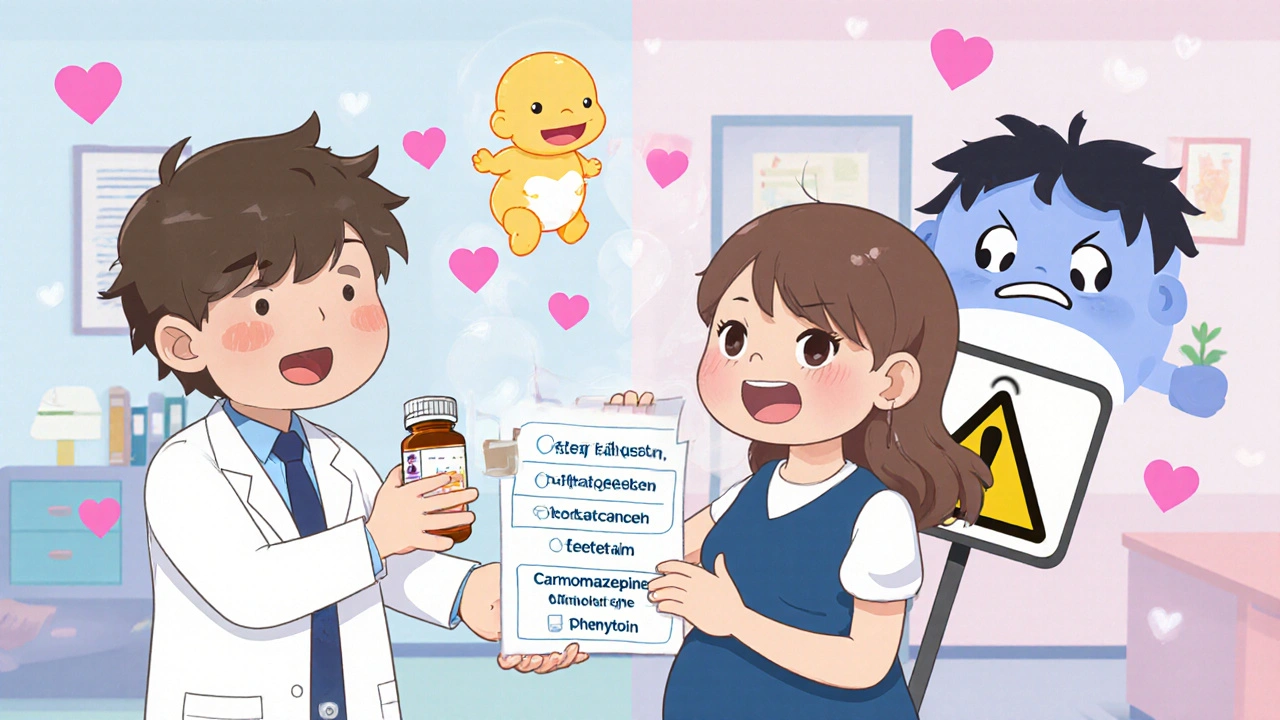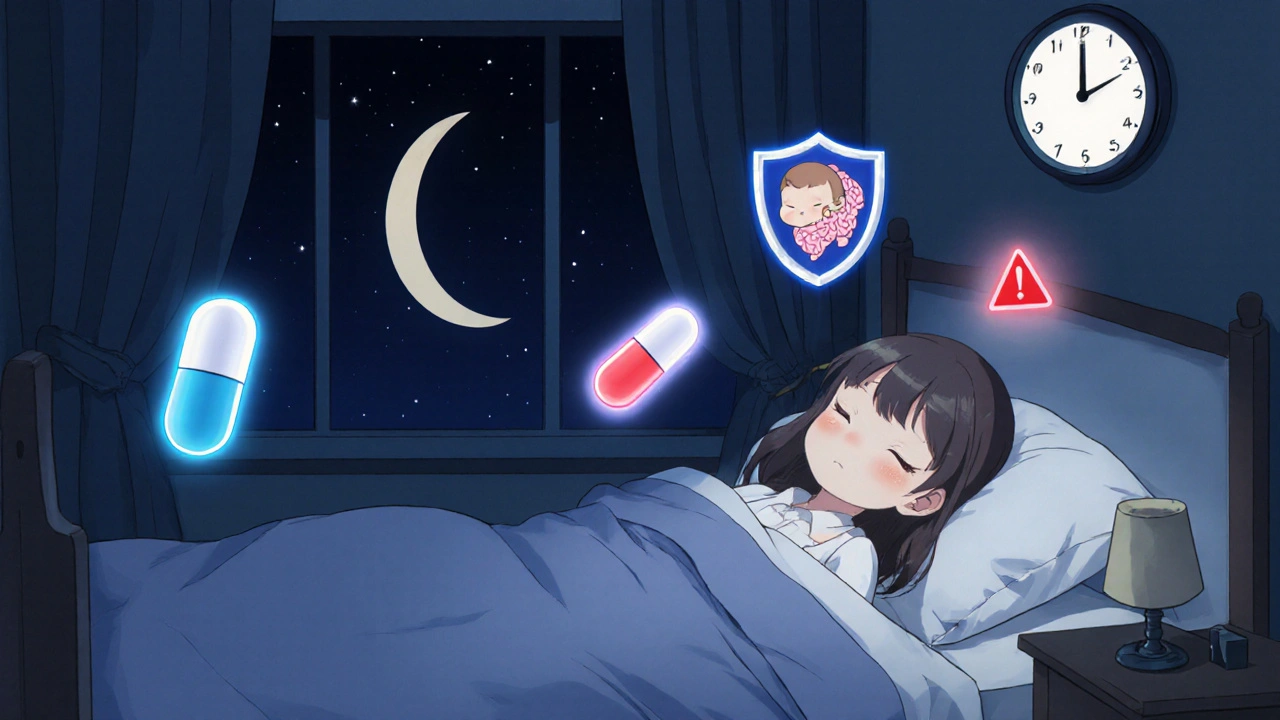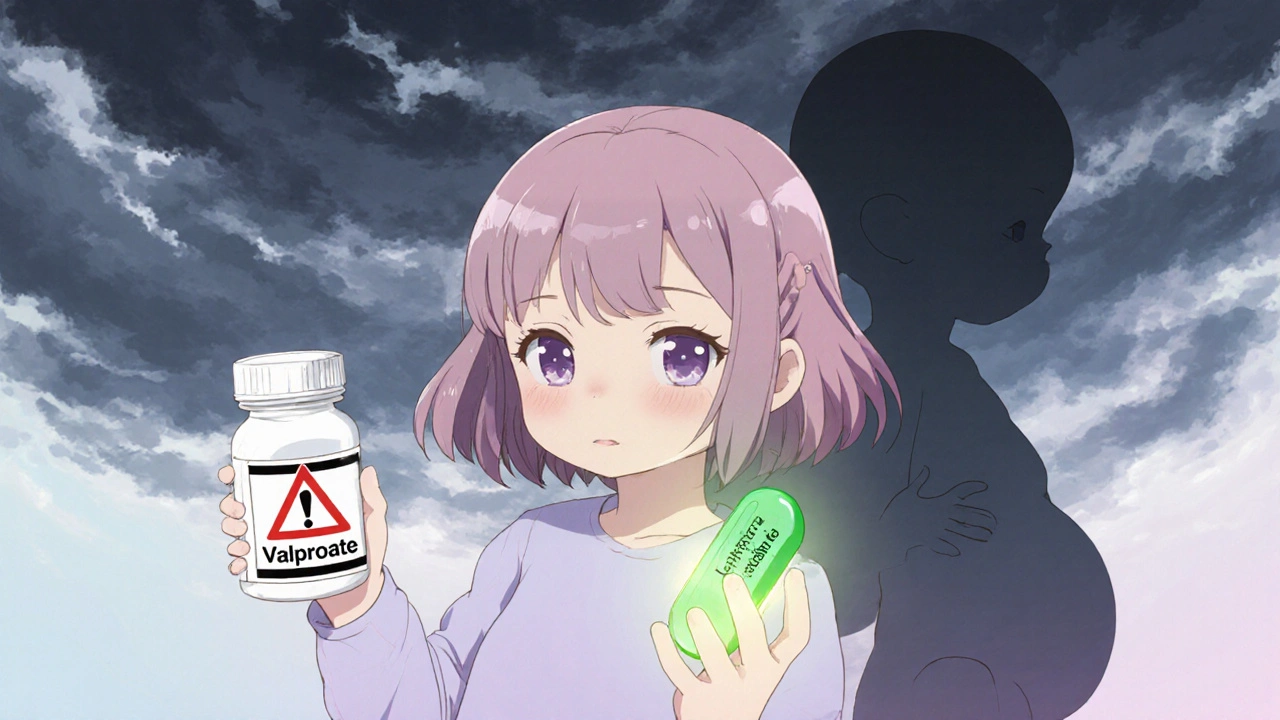When a woman with epilepsy becomes pregnant, she faces a difficult choice: keep taking her seizure medication to prevent dangerous seizures, or stop it to protect her baby - only to risk life-threatening seizures for both. This isn’t a hypothetical dilemma. It’s a daily reality for thousands of women. And the truth is, seizure medications can affect a developing baby - but so can uncontrolled seizures.
Some Seizure Medications Carry High Risks
Not all antiseizure drugs are the same when it comes to pregnancy. Some have been around for decades and come with well-documented dangers. Sodium valproate (valproic acid) is the most concerning. Around 10% of babies exposed to it during pregnancy develop major birth defects - nearly double the rate seen with other medications. These include heart problems, cleft lip or palate, spinal cord issues, and microcephaly (a smaller-than-normal head size). Studies also show these children are more than twice as likely to be diagnosed with autism or ADHD later in life.Other older drugs like carbamazepine, phenytoin, phenobarbital, and topiramate also raise the risk of physical birth abnormalities, though not as sharply as valproate. For example, carbamazepine increases the chance of heart defects and neural tube problems, especially at higher doses. Phenytoin is linked to fetal hydantoin syndrome, which can cause facial deformities, slow growth, and intellectual delays. Topiramate, even at lower doses, has been tied to cleft lip and low birth weight.
These risks aren’t random. They’re tied to how the drugs interact with fetal development. Some interfere with folate metabolism - a key nutrient for neural tube formation. Others directly affect cell growth in the brain and organs. The higher the dose, the greater the risk. That’s why doctors now push for the lowest effective dose - not just for seizure control, but for fetal safety.
Safer Options Exist - and They’re Widely Available
The good news? Not all seizure medications are risky during pregnancy. Lamotrigine (Lamictal) and levetiracetam (Keppra) have been studied extensively and show no significant increase in major birth defects compared to the general population. In fact, they’re now the go-to choices for women planning pregnancy.A 2021 Stanford study followed 298 children whose mothers took newer antiseizure drugs during pregnancy. At age two, their verbal skills were on par with children of mothers without epilepsy. While some subtle developmental differences were noted at very high drug levels, the overall picture was reassuring. These newer drugs - lamotrigine and levetiracetam especially - don’t appear to disrupt brain development the way older ones do.
The UK’s Medicines and Healthcare products Regulatory Agency (MHRA) confirms this. Their 2023 review found that lamotrigine and levetiracetam are the safest options currently available. Many neurologists now start women on these drugs before conception, even if they were previously stable on older medications. The goal isn’t just to avoid seizures - it’s to avoid harm to the baby, too.
Drug Interactions Can Undermine Both Birth Control and Seizure Control
Here’s something many women don’t realize: seizure medications can mess with birth control - and vice versa. Some antiseizure drugs, like carbamazepine, phenytoin, phenobarbital, and high-dose topiramate, speed up how the body breaks down hormones. That means birth control pills, patches, or rings can become less effective. Women on these drugs may think they’re protected - but they’re not.On the flip side, hormonal contraceptives can lower the levels of certain antiseizure drugs in the blood. Lamotrigine is especially vulnerable. When a woman starts taking birth control pills, her lamotrigine levels can drop by half. That raises the risk of breakthrough seizures - sometimes dangerously so. The same thing can happen with valproate, zonisamide, and rufinamide.
This isn’t a minor side effect. It’s a clinical emergency waiting to happen. A woman might be doing everything right - taking her meds, using birth control - and still end up with an unplanned pregnancy or a seizure in the middle of the night. That’s why doctors now check drug levels regularly when a woman starts or stops hormonal contraception. Sometimes, a higher dose of lamotrigine is needed. Sometimes, switching to a non-hormonal method like an IUD is the safest choice.

Uncontrolled Seizures Are Even More Dangerous
It’s easy to focus only on the risks of medication. But let’s be clear: having a tonic-clonic seizure during pregnancy is far more dangerous than taking lamotrigine. Seizures can cause oxygen deprivation, physical trauma, miscarriage, premature labor, or even death for both mother and baby. One study found that women with poorly controlled epilepsy had a 10 times higher risk of fetal death than those with good seizure control.This creates what experts call an "excruciating double bind." You need the drug to prevent seizures. But the drug might hurt the baby. The answer isn’t to stop medication. It’s to choose the right medication - at the right dose - and monitor closely.
The American Epilepsy Society and the NIH both agree: never stop your seizure medication without medical supervision. The risk of uncontrolled seizures outweighs the risk of most modern antiseizure drugs. The goal is balance - not avoidance.
Preconception Planning Is Non-Negotiable
The best time to talk about seizure medications and pregnancy isn’t after you find out you’re pregnant. It’s before you even try. Yet a 2023 study found that two-thirds of women of childbearing age with epilepsy answered basic questions about medication safety incorrectly. Only one in three received care that matched their reproductive goals.That’s why preconception counseling is now standard. A neurologist should review your current meds, switch you to safer options if needed, adjust your dose, and check your folate levels. Folic acid supplements - at least 0.4 mg daily, often higher - are recommended for all women with epilepsy planning pregnancy. They help reduce the risk of neural tube defects.
Women on valproate should be strongly advised to switch - if possible - before conception. If valproate is the only thing that controls their seizures, the risks must be weighed carefully, and the dose should be kept as low as possible. But in most cases, alternatives exist.

Progress Is Real - But Inequality Remains
There’s good news: between 1997 and 2011, the rate of major birth defects in babies exposed to antiseizure drugs dropped by 39%. That’s thanks to better prescribing, more awareness, and the use of safer drugs like lamotrigine and levetiracetam.But progress isn’t equal. A French study found that women with lower income or less access to healthcare were more likely to be prescribed high-risk drugs like valproate during pregnancy. They were also less likely to receive preconception counseling. This isn’t about individual choices - it’s about systemic gaps in care.
There are still 11 antiseizure drugs with insufficient data on pregnancy safety. That means some women are being treated with drugs we simply don’t know enough about. Ongoing research is critical.
What Women Need to Know Right Now
- If you’re on valproate and planning pregnancy, talk to your doctor about switching - now.
- Lamotrigine and levetiracetam are the safest options for pregnancy - if they work for your seizures.
- Birth control pills, patches, or rings may not work if you’re on carbamazepine, phenytoin, phenobarbital, or high-dose topiramate.
- If you’re on lamotrigine and start hormonal birth control, your drug levels may drop. Tell your neurologist immediately.
- Never stop your seizure medication without medical advice - even if you’re trying to get pregnant.
- Take high-dose folic acid (at least 0.4 mg, often 5 mg) before and during pregnancy.
- Get preconception counseling from a neurologist who specializes in epilepsy and pregnancy.
More than 90% of babies born to women with epilepsy are healthy. That’s not luck. It’s careful planning, better drugs, and informed choices. You don’t have to choose between being a good mother and being a healthy one. With the right care, you can be both.
Can I take seizure medication while pregnant?
Yes - but not all seizure medications are safe. Lamotrigine and levetiracetam are considered low-risk and are often recommended during pregnancy. Drugs like valproate, phenytoin, and phenobarbital carry higher risks of birth defects and should be avoided if possible. Never stop your medication without talking to your doctor, because uncontrolled seizures are more dangerous to both you and your baby.
Do seizure medications cause autism?
Some seizure medications are linked to a higher risk of autism spectrum disorder (ASD) in children exposed before birth. Valproate carries the strongest association - studies show more than double the risk compared to other antiseizure drugs. Lamotrigine and levetiracetam show no increased risk. The key is choosing the right medication before pregnancy and sticking with the lowest effective dose.
Can birth control pills interfere with seizure meds?
Yes. Hormonal contraceptives can lower blood levels of certain seizure medications, especially lamotrigine, valproate, zonisamide, and rufinamide. This can lead to breakthrough seizures. Conversely, some seizure drugs like carbamazepine and phenytoin can make birth control pills less effective, raising the risk of unplanned pregnancy. Always discuss contraception options with your neurologist and gynecologist.
Is it safe to breastfeed while taking seizure medication?
Yes, most antiseizure medications are considered safe during breastfeeding. Lamotrigine and levetiracetam pass into breast milk in very low amounts and rarely affect the baby. Even valproate is generally considered acceptable if the baby is healthy and monitored. The benefits of breastfeeding usually outweigh the small risks. Always check with your doctor before making a decision.
How can I reduce the risk of birth defects?
Take high-dose folic acid (5 mg daily) before conception and through the first trimester. Switch to safer seizure medications like lamotrigine or levetiracetam before getting pregnant. Use the lowest effective dose of your medication. Avoid valproate if possible. Get preconception counseling from a neurologist who specializes in epilepsy and pregnancy. Regular prenatal care and monitoring are also essential.
Are newer seizure medications safer than older ones?
Yes. Newer-generation drugs like lamotrigine and levetiracetam have been studied more thoroughly in pregnancy and show significantly lower risks of birth defects and developmental delays compared to older drugs like valproate, phenytoin, and phenobarbital. Between 1997 and 2011, the rate of major birth defects dropped by 39% - largely due to better prescribing practices and the shift toward safer medications.
What should I do if I’m already pregnant and taking valproate?
Do not stop taking valproate suddenly - that could trigger dangerous seizures. Contact your neurologist immediately. They may consider switching you to a safer medication, but only if your seizures can be controlled with the change. Your doctor will weigh the risks of continuing valproate against the risks of changing your treatment. Close monitoring with ultrasounds and blood tests will be needed.
Why don’t all women get preconception counseling?
Many women don’t receive counseling because epilepsy care is often separated from reproductive health services. Some doctors assume pregnancy isn’t planned, or they don’t know the latest guidelines. Others lack time or resources. Studies show women with lower income or limited access to specialists are less likely to get this care - even though they’re at higher risk of being prescribed dangerous drugs. Advocacy and better coordination between neurologists and OB-GYNs are needed to fix this gap.

11 Comments
Rashmi Mohapatra
lol so valproate = baby disaster zone? guess i’ll stick to my lamotrigine then. my neuro said same thing but i thought she was just being extra. turns out she’s the actual MVP.
Abigail Chrisma
This is such an important post. I’m a mom of two with epilepsy, and I switched from carbamazepine to lamotrigine before trying for my second. The difference in my anxiety levels alone was night and day. And yes, folic acid is non-negotiable. I took 5mg daily - my OB literally printed out the study and hung it on the fridge. We got lucky. But so many don’t.
Ankit Yadav
if you’re on valproate and pregnant dont panic but dont delay either. talk to your neuro. most of us can switch. and yes birth control + topiramate = gamble. i lost count of how many friends got pregnant ‘by accident’ because their pills stopped working. its not their fault. its the system.
Meghan Rose
Okay but let’s be real - lamotrigine isn’t magic. My cousin’s kid had a seizure at 6 months and they were on it the whole time. And now they’re blaming the med? Maybe it’s genetics. Or maybe the mom just didn’t take enough. Or maybe she was on it with alcohol. Nobody talks about that.
Steve Phillips
You’re telling me... that modern medicine - after decades of research - has finally figured out that VALPROATE IS A DEVIL’S DRUG?!?!? And we’re only now telling women this?!?!!? We’ve been giving this to teenage girls since the 90s like it’s a vitamin!?!? I’m not crying... I’m just... *deeply disappointed* in neurology as a field. 🤦♀️💔
Rachel Puno
you got this. seriously. i was terrified when i got pregnant but my neurologist and OB worked together like a dream. we adjusted my dose, i took my folic acid like it was my job, and my daughter is now a happy 3-year-old who says ‘meds’ instead of ‘bottle’. you’re not alone. you’re not failing. you’re fighting.
Clyde Verdin Jr
soooo... if i take lamotrigine and get pregnant, is my kid gonna be a genius? or just not have a cleft palate? 🤔 i mean, i’m just trying to understand the tradeoff here. also, can i still drink wine? 🍷😂
Key Davis
The clinical and ethical imperative for preconception counseling in women of childbearing potential with epilepsy cannot be overstated. The evidence base supporting lamotrigine and levetiracetam as first-line agents is robust and has been corroborated by multiple prospective cohort studies. Failure to provide such counseling constitutes a systemic deficiency in reproductive neurology.
Cris Ceceris
It’s wild how we treat epilepsy like it’s a defect to be fixed, but pregnancy is this sacred thing that needs protection - like the two can’t coexist. But they do. And women are doing it. Every day. Without fanfare. Without medals. Just taking pills, counting folic acid, and hoping their doctors remember to check levels. Maybe the real breakthrough isn’t the drug - it’s the quiet, stubborn love of a mother who refuses to choose.
Brad Seymour
I’m from the UK and we’ve been pushing this for years. MHRA guidelines are solid. But you know what? Most women don’t even know their meds. I asked my cousin last week what she was on - she said ‘the blue one’. I cried. We need better education. Not just for patients - for GPs too.
Malia Blom
So let me get this straight - the real villain here isn’t the drug, it’s the patriarchy? The system? The fact that women’s reproductive health is an afterthought in neurology? And now we’re gonna make it about ‘choice’? But what if you don’t have access to a neurologist who cares? Or live in a state that cuts Medicaid? Or can’t afford 5mg folic acid? This post reads like a luxury pamphlet for rich white women. The rest of us are just trying not to die in a seizure while our kids cry in the ER.